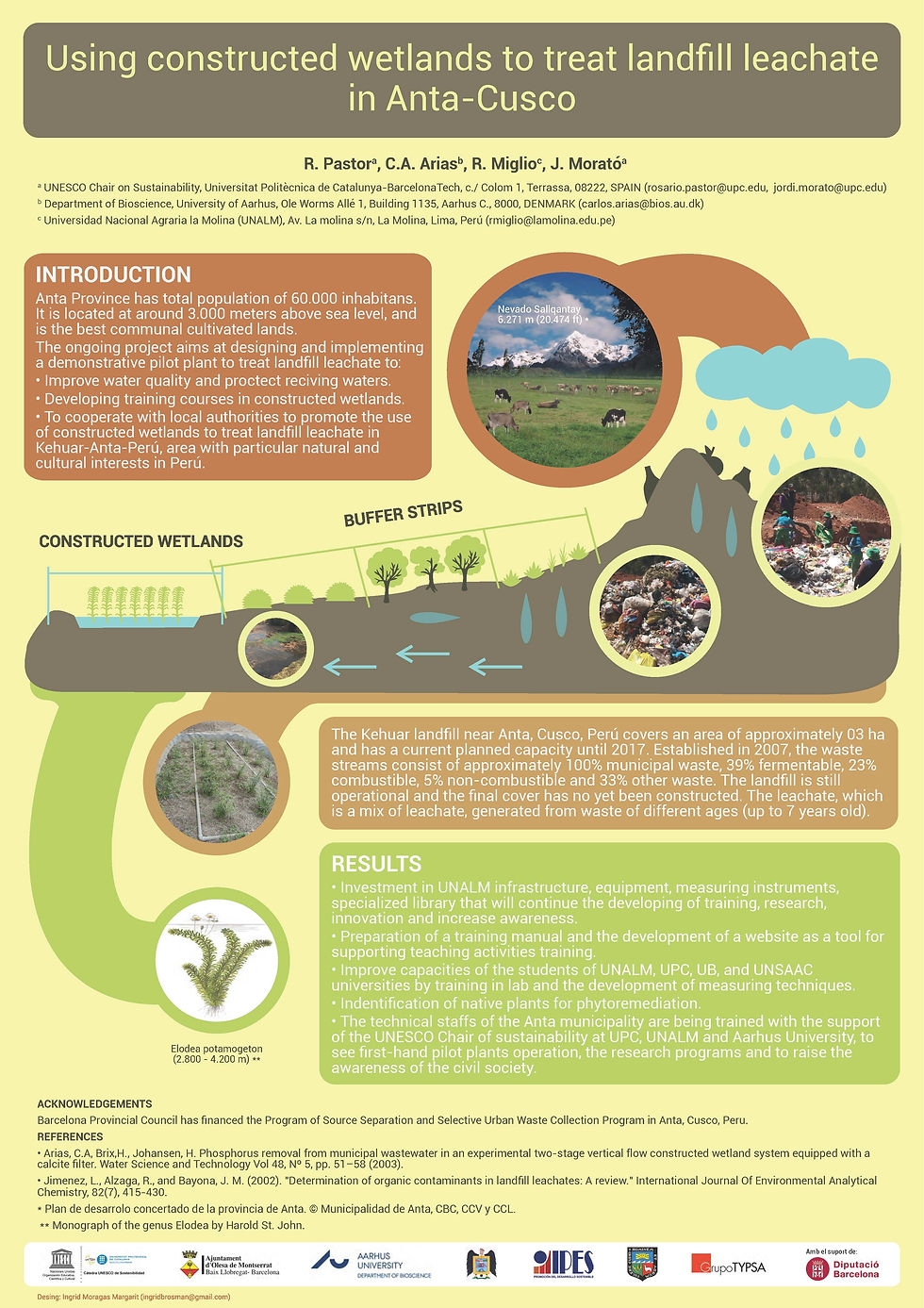RESDIBA II - Strengthening of the segregation and selective waste collection program
- TIC UNESCOSOST

- Nov 26, 2015
- 3 min read
The RESDIBA II project "Strengthening the segregation and selective waste collection program", funded by the Diputación de Barcelona, was developed during 2015, with the purpose of strengthening the technical capacities of the Environmental Management Office of the Anta Provincial Municipality in the areas of segregation at source and selective collection of urban solid waste and the treatment of leachate from the sanitary landfill.

The actions are intended to:
Contribute to the creation of a support unit to implement the program of segregation at source and selective collection for the generation of jobs and give an opportunity for integration to the disadvantaged people
Promote the active participation of the population from the Provincial Municipality of Anta-Cuzco in the Program of Segregation at Source and selective collection
Evaluate the treatment of leachates from the landfill (Landfill) of Anta through the use of treatment wetlands
Organization of dissemination and dissemination days in the province of Anta and Olesa de Montserrat.
The project addresses the segregation at source and the selective collection of urban solid waste in the province of Anta, considering that in Peru this activity is carried out predominantly informally. Therefore, one of the key actions of the proposal is the formalization of waste pickers and will be emphasized in the framework of the 29419 law that provides tools to initiate processes for the formalization of waste pickers in each of the 9 districts of the province of Anta.
In the technical assistance, the following activities will be carried out:
I. Theoretical-practical training on solid waste management in Barcelona
Theoretical-practical training of technical staff from the municipality of Anta and of the UNALM + IPES in the UNESCO Chair on sustainability from the UPC at Barcelona. An exchange of experiences takes place between the municipality of Anta and the Ajuntament d'Olesa de Montserrat. Institutional visits in Barcelona (Nov 2015 Barcelona).
II. Promote the creation of the support unit for the program of segregation at the source and selective collection, coordinated by UNESCO_SOST, the municipality of ANTA and IPES:
Formal registration of the Association of urban waste pickers, in the SUNARP and the municipality
Training workshops
Purchase of equipment and materials, uniforms and tricycles for selective collection
Hepatitis B and Tetanus vaccines for waste pickers
Training for officials of the 9 districts,
Technical assistance for the accompaniment and formalization of waste pickers
Training for technical officers to achieve the Incentives Plan for the Improvement of Municipal Management and Modernization (PI).
III. Promote the active participation of the population of the Provincial Municipality of Anta-Cuzco in the Program of Segregation in Origin and selective collection. Speakers UPC, UNALM, Municipality of Anta, Ajuntament d'Olesa, TYPSA, IPES
Carry out 02 awareness campaigns related to segregation at the source and selective collection
Perform 01 School Fair in Anta
Perform 01 Environmental Contest: Recycling of materials
IV. Evaluate the treatment of the leachate from the landfill (Landfill) of Anta through treatment wetlands.
- Theoretical-practical training of Technicians of the Municipality of Anta in the facilities of the UPC and the UNALM as well as the exchange of experiences between universities and local and international entities. The UPC, UNALM, Municipality of Anta, Ajuntament d'Olesa, TYPSA, IPES participate.
- Final Master Project:
"Artificial wetlands for the treatment of leachates of the organic fraction of the solid waste from the Anta - Cusco sanitary landfill". Diego Suero, UNALM
The demonstration plant will be formed by an initial pre-treatment stage formed by a "buffer strip" (vegetated strips) that intercept the rainwater, decreasing the generation of leachate and exerting a phytoremediation action at the same time. Subsequently, the leachate that is collected from the soil is conducted to the natural treatment system, formed by a wetland constructed of vertical subsurface flow.
The experience gained in the Moravia project with the community gardens will be taken as reference. An improved version (v2) of this multifunctional natural technology is designed. The improved version or Community Gardens v2, adds the function of adaptation to extreme weather events such as torrential rains, floods and landslide risk and ecosystem function for the control of runoff / rainwater and diffuse pollution. With the community gardens v2 there is a participatory multifunctional tool that allows the strengthening of resilience and the decrease of local vulnability.
- Final Master Project:
Luisa Madolyn Alvarez, Becaria University of Barcelona
V. Communication, dissemination and dissemination of the results obtained and V. Coordination and follow-up
There will be virtual and face-to-face monitoring and coordination meetings with the participation of the UPC, UNALM, Municipality of Anta, Ajuntament d'Olesa, TYPSA, IPES





Comments